
Animal Farm is a satirical allegorical novella, in the form of a beast fable, by George Orwell, first published in England on 17 August 1945. It tells the story of a group of anthropomorphic farm animals who rebel against their human farmer, hoping to create a society where the animals can be equal, free, and happy. Ultimately, the rebellion is betrayed, and under the dictatorship of a pig named Napoleon, the farm ends up in a state far worse than before.

Erewhon: or, Over the Range is a novel by English writer Samuel Butler, first published anonymously in 1872, set in a fictional country discovered and explored by the protagonist. The book is a satire on Victorian society.

Eric Arthur Blair was a British novelist, poet, essayist, journalist, and critic who wrote under the pen name of George Orwell, a name inspired by his favourite place River Orwell. His work is characterised by lucid prose, social criticism, opposition to all totalitarianism, and support of democratic socialism.
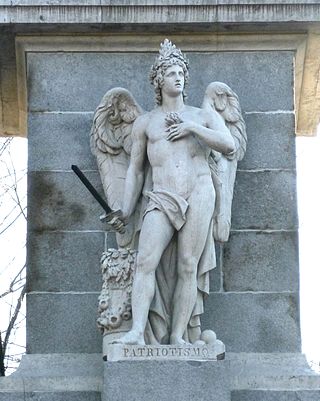
Patriotism is the feeling of love, devotion, and a sense of attachment to a country or state. This attachment can be a combination of different feelings for things such as the language of one's homeland, and its ethnic, cultural, political, or historical aspects. It may encompass a set of concepts closely related to nationalism, mostly civic nationalism and sometimes cultural nationalism.

Keep the Aspidistra Flying, first published in 1936, is a socially critical novel by George Orwell set in 1930s London. The main theme is Gordon Comstock's romantic ambition to defy worship of the money-god and status, and the dismal life that results.
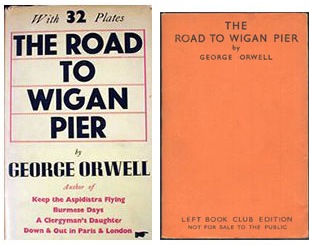
The Road to Wigan Pier is a book by the English writer George Orwell, first published in 1937. The first half of this work documents his sociological investigations of the bleak living conditions among the working class in Lancashire and Yorkshire in the industrial north of England before World War II. The second half is a long essay on his middle-class upbringing, and the development of his political conscience, questioning British attitudes towards socialism. Orwell states plainly that he himself is in favour of socialism, but feels it necessary to point out reasons why many people who would benefit from socialism, and should logically support it, are in practice likely to be strong opponents.
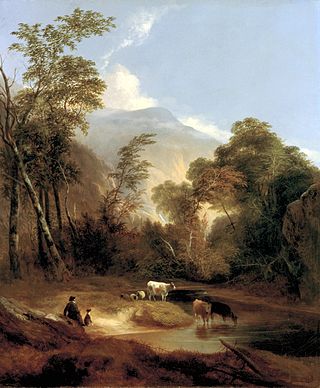
The pastoral genre of literature, art, or music depicts an idealised form of the shepherd's lifestyle – herding livestock around open areas of land according to the seasons and the changing availability of water and pasture. The target audience is typically an urban one. A pastoral is a work of this genre. A piece of music in the genre is usually referred to as a pastorale.

"Politics and the English Language" (1946) is an essay by George Orwell that criticised the "ugly and inaccurate" written English of his time and examined the connection between political orthodoxies and the debasement of language.

2 + 2 = 5 or two plus two equals five is a mathematical falsehood which is used as an example of a simple logical error that is obvious to anyone familiar with basic arithmetic.

Temperance in its modern use is defined as moderation or voluntary self-restraint. It is typically described in terms of what a person voluntarily refrains from doing. This includes restraint from revenge by practicing mercy and forgiveness, restraint from arrogance by practicing humility and modesty, restraint from excesses such as extravagant luxury or splurging, restraint from overindulgence in food and drink, and restraint from rage or craving by practicing calmness and equanimity. The distinction between temperance and self-control is subtle. A person who exhibits self-control wisely refrains from giving in to unwise desires. A person who exhibits temperance does not have unwise desires in the first place because they have wisely shaped their character in such a way that their desires are proper ones. Aristotle suggested this analogy: An intemperate person is like a city with bad laws; a person who lacks self control is like a city that has good laws on the books but doesn’t enforce them.
"Inside the Whale" is an essay in three parts written by George Orwell in 1940. It is primarily a review of Tropic of Cancer by Henry Miller with Orwell discoursing more widely over English literature in the 1920s and 1930s. The biblical story of Jonah and the whale is used as a metaphor for accepting experience without seeking to change it, Jonah inside the whale being comfortably protected from the problems of the outside world. It was published, alongside two other pieces by Orwell, 11 March 1940 by Gollancz in Orwell's first collection of essays, Inside the Whale and Other Essays.
"Why I Write" (1946) is an essay by George Orwell detailing his personal journey to becoming a writer. It was first published in the Summer 1946 edition of Gangrel. The editors of this magazine, J.B.Pick and Charles Neil, had asked a selection of writers to explain why they write.
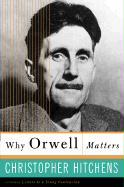
Why Orwell Matters, released in the UK as Orwell's Victory, is a book-length biographical essay by Christopher Hitchens. In it, the author relates George Orwell's thoughts on and actions in relation to: The British Empire, the Left, the Right, the United States of America, English conventions, feminism, and his controversial list for the British Foreign Office.
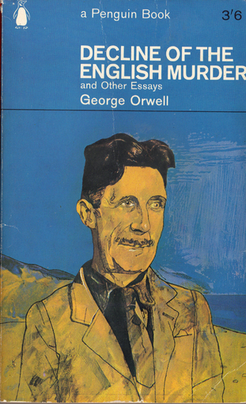
"Decline of the English Murder" is an essay by English writer George Orwell, wherein he analysed the kinds of murders depicted in popular media and why people like to read them. Tribune published it on 15 February 1946, and Secker and Warburg republished it after his death in Shooting an Elephant and Other Essays in 1952.
In the dystopian novel Nineteen Eighty-Four (1949), by George Orwell, Newspeak is the fictional language of Oceania, a totalitarian superstate. To meet the ideological requirements of Ingsoc in Oceania, the Party created Newspeak, which is a controlled language of simplified grammar and limited vocabulary designed to limit a person's ability for critical thinking. The Newspeak language thus limits the person's ability to articulate and communicate abstract concepts, such as personal identity, self-expression, and free will, which are thoughtcrimes, acts of personal independence that contradict the ideological orthodoxy of Ingsoc collectivism.
"Books v. Cigarettes" is an essay published in 1946 by the English author George Orwell. It compares the costs of reading to other forms of recreation including tobacco smoking.
"Some Thoughts on the Common Toad" is an essay published in 1946 by the English author George Orwell. It is a eulogy in favour of spring.

Nineteen Eighty-Four is a dystopian novel and cautionary tale by English writer George Orwell. It was published on 8 June 1949 by Secker & Warburg as Orwell's ninth and final book completed in his lifetime. Thematically, it centres on the consequences of totalitarianism, mass surveillance, and repressive regimentation of people and behaviours within society. Orwell, a staunch believer in democratic socialism and member of the anti-Stalinist Left, modelled the Britain under authoritarian socialism in the novel on the Soviet Union in the era of Stalinism and on the very similar practices of both censorship and propaganda in Nazi Germany. More broadly, the novel examines the role of truth and facts within societies and the ways in which they can be manipulated.
"The Art of Donald McGill" is a critical essay first published in 1941 by the English author George Orwell. It discusses the genre of English saucy seaside postcards that were sold mostly in small shops in British coastal towns, and particularly the work of its prime exponent, Donald McGill. Orwell notes the role of this type of humour as a rebellion against convention in society and states that, despite the vulgarity, he would be sorry to see the postcards vanish.
"The Sporting Spirit" is an essay by George Orwell published in the magazine Tribune on 14 December 1945, and later in Shooting an Elephant and Other Essays, a collection of Orwell's essays published in 1950. The essay was written on the heels of the 1945 tour of Great Britain by the Soviet football team FC Dynamo Moscow. The essay became famous for Orwell's description of international sporting competitions as "war minus the shooting", a phrase that has since been used as a metaphor for sports when referred to in popular media and for actions evoking hyper-nationalism and national pride.